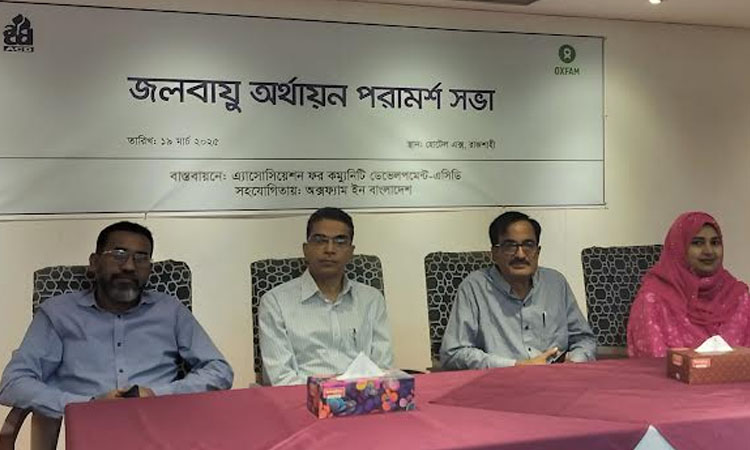News Flash

RAJSHAHI, March 19, 2025 (BSS) - Adverse impacts of climate change pose a serious threat to agriculture, fisheries, and livestock sectors, as well as the livelihoods and living conditions of marginalized communities, including ethnic minorities, in the region, particularly in the vast Barind tract.
So, coordinated efforts of all relevant government, non-government and international organizations can play a crucial role to mitigate the effects, saving the environment and, improving the resilience of affected communities.
Speakers unanimously came up with the observations today at a discussion organized by the Association for Community Development (ACD) as part of its "Cultivating Change Project." The district-level meeting, titled "Climate Change Adaptation Financing," was held at Hotel X in the city with support from Oxfam in Bangladesh.
During his keynote presentation, Prof Chowdhury Sarwar Jahan from the Department of Geology and Mining at Rajshahi University highlighted the extent of losses caused by the harmful effects of climate change and discussed mitigation strategies.
He emphasized that proper financing has become an urgent need to protect the drought-prone Barind region from these impacts.
Deputy Director of the Department of Women Affairs Shobnom Shirin, Deputy Director of the Department of Youth Development ATM Golam Mahbub, Deputy Director of Cattle Development Centre Dr Ismail Haque and General Secretary of Bangladesh Livestock Society Dr Hemayetul Islam also spoke at the event.
ACD Programme Coordinator Subrata Kumar Paul moderated the discussion.
The meeting puts emphasis on ensuring Bangladesh's rightful access to climate finance from national and international sources.
It has also stressed the need for transparency and accountability in utilizing these funds and urged all stakeholders to work collectively to achieve this goal.
At the meeting, the speakers highlighted the importance of a transparent, accountable and participatory governance system for managing climate funds.
Otherwise, it would be challenging to fulfil the fund's core objectives and the potential for securing funds from national and international sources could be compromised.
Terming the women and children as the most vulnerable to climate change, the meeting unequivocally called for the preservation of women's climate struggle records, active dialogue with policymakers, and the formulation of gender-sensitive laws and policies.
Describing various negative impacts caused by global climate change, the experts discussed the impact of climate change on agriculture, capacity building related to the local adaptation process and raising awareness among ethnic minority women in terms of their access to climate funds.